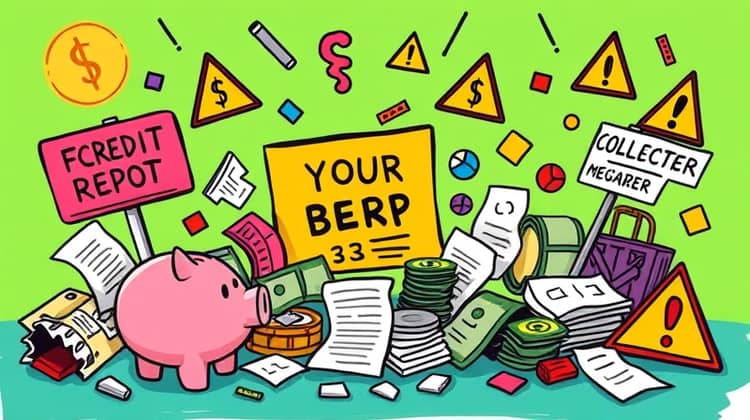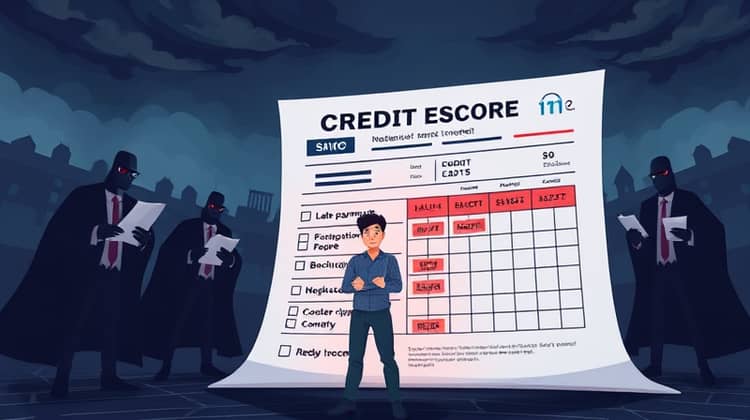Credit Score Cleanup: When Will Negative Marks Disappear?

Maintaining a healthy credit score is crucial for financial well-being. It affects our ability to secure loans, credit cards, and favorable interest rates. One of the most significant factors influencing credit scores are the negative marks that can appear on credit reports due to various financial missteps.
Understanding what negative marks are, how they affect one's credit score, and procedures for removal can empower individuals to take control of their financial future. This article will explore these aspects in detail to help you navigate the journey of credit score improvement.
What are Negative Marks on a Credit Report?

Negative marks on your credit report are derogatory indications from creditors that signal your inability to meet financial obligations. They can arise from missed payments, defaults, bankruptcies, and more. These marks may linger on your credit report and influence how lenders assess your creditworthiness.
Typically, negative marks can be categorized into several types, and understanding them is pivotal for anyone working to improve their credit score.
- Late payments
- Defaults
- Bankruptcy
- Foreclosure
- Collections accounts
Recognizing these negative markers is the first step in rectifying your financial standing and initiating the cleanup of your credit report. The longer these marks remain, the more challenging it may become to secure credit at favorable terms.
How Negative Marks Affect Your Credit Score

Negative marks can significantly lower your credit score, making you appear risky to potential creditors. Each type of negative mark can contribute varying degrees of impact; for instance, a bankruptcy will generally hurt your score more than a missed payment.
When creditors evaluate your credit risk, they will review your credit report, and the presence of negative marks will often lead to higher interest rates or outright loan denials. Understanding this risk can motivate you to take action on resolving negative issues.
- A single late payment can decrease your score by 60-110 points
- Bankruptcy can reduce your score by 130-240 points
- Negative marks can stay on your report from 7 to 10 years
- Lenders may deny credit applications based on the presence of these marks
Ultimately, negative marks not only affect your credit score but also your financial freedom and access to credit options. Thus, understanding their implications is essential for anyone seeking to enhance their credit profile.
When Do Negative Marks Disappear?

The duration negative marks stay on your credit report can vary based on the type of mark. Generally, minor issues like missed payments can remain for about seven years, while major ones like bankruptcy may linger for up to ten years.
It’s crucial to be aware of these timelines, as they can influence your financial strategy and decision-making for years ahead. Knowing when these marks disappear can help you plan for future credit endeavors.
- Late payments stay for up to 7 years
- Accounts in collections remain for 7 years
- Bankruptcies generally affect your score for 7-10 years depending on the type
- Foreclosures can stay on your report for up to 7 years
Being cognizant of the timeframes for negative marks is a part of maintaining your credit health. This knowledge allows you to plan ahead and take the necessary steps to mitigate their impact effectively.
How to Remove Negative Marks from Your Credit Report

Erasing negative marks from your credit report is often challenging, but there are effective strategies to tackle this issue. It starts with obtaining a free copy of your credit report to understand what needs to be addressed and identify any inaccuracies.
Once you have obtained your report, you can challenge negative entries that are incorrect or unverifiable, which can help improve your credit score.
- Request a copy of your credit report
- Review the report for inaccurate entries
- Gather documentation to support your claims
- File a dispute with the credit bureau for errors
- Follow up to ensure corrections are made
By taking these steps diligently, you can improve your credit report and ultimately your credit score, paving the way for better financial opportunities.
Tips to Improve Your Credit Score

Improving your credit score involves more than just removing negative marks; it requires ongoing commitment to sound financial practices. Adopting proactive financial habits will generally lead to higher credit scores over time.
Here are some practical tips to help you on your journey to a better credit score that can qualify you for lower interest rates and more favorable loan terms.
- Make timely payments on debts and bills
- Keep credit card balances low
- Avoid opening too many new accounts at once
- Monitor your credit report regularly
- Limit hard inquiries on your credit
By integrating these practices into your financial routine, you can work towards a cleaner credit report and a healthier credit score, providing a solid foundation for your financial future.






